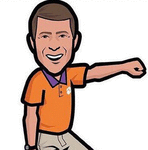|
Replies: 22
| visibility 1
|
CU Guru [1698]
TigerPulse: 100%
Posts: 998
Joined: 7/3/06
|
Is there any way to avoid
Jul 13, 2016, 5:29 PM
|
|
Some of these athletes passing away with somehow doing more thorough heart tests?
I've seen a few sources that say Stitt had a heart attack.
I know some guys may have heart issues (Devin Gray, Chris Hobbs?), but how can guys like Gaines Adams or Demontez Stitt be in peak physical condition and trainers/doctors not catch some of these signs like enlarged hearts or something that would cause a heart attack??
I may be totally ignorant about it but just don't understand how these guys couldn't have been screened more thoroughly year to year.
Too dang young to pass!
|
|
|
|
 |
All-In [40100]
TigerPulse: 100%
Posts: 18284
Joined: 10/28/15
|
This is actually a constant debate in medicine. I do alot
Jul 13, 2016, 5:46 PM
|
|
of sports physicals. The problem is that it isn't immediately evident. If I listen to your heart, I'm not going to be able to hear anything that tips me off to a condition that causes sudden death typically. The society that makes recommendations on athletes currently doesn't recommend getting EKGs on every athlete. They do in Europe. I know this on the surface seems silly. However, what athletes die from in Europe is typically hereditary and is of a high prevalence in those countries and can be seen on EKGs. However, due to a different gene pool here in the United States, what young men typically die early from is a different condition and an EKG would generally not catch. So, what you would actually need is an echocardiogram. To screen all athletes for this with echocardiograms would flood cardiologist offices. There isn't enough access to echocardiograms/cardiologists to screen all athletes. I hate to admit to it, but it comes down to money too. Most insurance companies including government programs aren't going to pay to routinely screen young men with echocardiograms. Most insurance companies including the government, I hate to say it, base their screenings on a cost benefit analysis of how many people they would have to screen in order to find one person who would benefit from the screen. And, I would venture to guess that echocardiogram might not catch some of these anyways. So, what I'm saying is you have a very good question, that doesn't have an easy answer. Without some hint of symptoms or a family history of sudden death, it is very unlikely to catch the conditions that effect the athlete. Obviously these athletes are in very good shape on the surface so they don't tend to have symptoms until they have the sudden death that results and not a lot can be done at that point. Really unfortunate, and a lot of research goes into it, but there is certainly not an answer at this point.
|
|
|
|
|
 |
CU Guru [1698]
TigerPulse: 100%
Posts: 998
Joined: 7/3/06
|
thanks for your insight
Jul 13, 2016, 5:56 PM
|
|
I appreciate you explaining it to those of us not in the world of medicine. Either way, it's so sad. Hope research can continue and see progress.
|
|
|
|
|
 |
All-In [25888]
TigerPulse: 100%
Posts: 20597
Joined: 7/31/07
|
Re: This is actually a constant debate in medicine. I do alot
Jul 13, 2016, 5:57 PM
[ in reply to This is actually a constant debate in medicine. I do alot ] |
|
I guess this would be the same as a frequent jogger having a massive heart attack. When things line up, something has to happen.
|
|
|
|
|
 |
All-American [559]
TigerPulse: 98%
Posts: 434
Joined: 2/6/14
|
|
|
|
|
 |
All-In [40100]
TigerPulse: 100%
Posts: 18284
Joined: 10/28/15
|
Yes. And I guess you are going to give me
Jul 13, 2016, 6:11 PM
|
|
Some insight that sports medicine physicians, cardiologists, primary care physicians, around the world are researching and pouring a lot of money In and geneticists as well as other specialists are researching and don't have an answer to? I am just trying to be truthful. It does suck and if I had tools or the ability to prevent it believe me I would. I'm not being flippant and if my response makes you think I don't care then you couldn't be farther from the truth. I'm just trying to spell out that it's not as easy to solve as it may seem like on the surface. If you know better and think you have the answer then please share.
|
|
|
|
|
 |
All-American [559]
TigerPulse: 98%
Posts: 434
Joined: 2/6/14
|
I actually didn't read your whole post
Jul 13, 2016, 6:46 PM
|
|
And I'm sure most of it is spot on but your first statement threw me off. If you are actually doing sports physicals, you may want to learn what to listen for that may tip you off to the main cause of sudden death in young athletes. Listening for this is probably the most important part of the exam. (And an echo will in fact show evidence of that main cause I'm referring to)
|
|
|
|
|
 |
All-In [40100]
TigerPulse: 100%
Posts: 18284
Joined: 10/28/15
|
I know how to listen to a heart, if something
Jul 13, 2016, 6:55 PM
|
|
Is abnormal I refer them to cardiology and they get an echocardiogram. My point is to catch all you would have to do genetic testing tilt table, ekg, stress test, echocardiogram, and genetic testing and still may miss some. It sounds like you know of what I speak. I do know how to listen to a heart . . . Again my point is there are multiple conditions, extremely rare, and there isn't an easy solution. Yes you can catch some with auscultation.
|
|
|
|
|
 |
Rock Defender [53]
TigerPulse: 90%
Posts: 35
Joined: 11/30/98
|
Re: I actually didn't read your whole post
Jul 13, 2016, 7:13 PM
[ in reply to I actually didn't read your whole post ] |
|
Wow - just effin' wow - you didn't read the entire post, and you're probably NOT a physician (let's hope not anyway), and telling someone else in the medical field how to do their job. Most freakin' interesting. I never knew stuff like this actually happened in real life.
btw: Don't bother to tell me how to program computers, 'cause you're gonna get embarrassed. Jes sayin'.
|
|
|
|
|
 |
All-In [40100]
TigerPulse: 100%
Posts: 18284
Joined: 10/28/15
|
I appreciate you sticking up for me and
Jul 13, 2016, 7:57 PM
|
|
Common decency, but I think he's actually a physician and likely a good one. I just think he locked in to one sentence I might have worded better. I'm all good. Go Tigers!
|
|
|
|
|
 |
Orange Blooded [4142]
TigerPulse: 100%
Posts: 4935
Joined: 3/30/03
|
Re: I appreciate you sticking up for me and
Jul 13, 2016, 9:13 PM
|
|
I'm sticking up for you , too .
Everyone on tnet is gonna die .
It's just a shame when someone we know of goes at such an early age and unexpectedly , also .
|
|
|
|
|
 |
All-In [40100]
TigerPulse: 100%
Posts: 18284
Joined: 10/28/15
|
Sad indeed!***
Jul 13, 2016, 9:21 PM
|
|
|
|
|
|
|
 |
All-American [559]
TigerPulse: 98%
Posts: 434
Joined: 2/6/14
|
Loving it
Jul 13, 2016, 9:50 PM
|
|
My apologies for being an @ss. You seem like a stand up person. One of my pet peeves is people spreading false medical info on the internet and I took out my frustration on one little detail that appeared to be a misunderstanding.
As always, go tigers.
|
|
|
|
|
 |
All-In [40100]
TigerPulse: 100%
Posts: 18284
Joined: 10/28/15
|
We're good. Thanks. Go Tigers!***
Jul 13, 2016, 10:25 PM
|
|
|
|
|
|
|
 |
All-Conference [401]
TigerPulse: 92%
Posts: 1665
Joined: 11/30/98
|
EKG screenings
Jul 13, 2016, 10:58 PM
|
|
One thing I would like to see is EKGs. I know some other programs in the ACC do an EKG on all incoming freshmen physicals. Rather low yield in such a young, healthy population, but might pick up a subtle finding in an overall benign appearing EKG or get a nice needle in a haystack especially combined with family history, lineage or a targeted history. It also has a relatively low true cost.
|
|
|
|
|
 |
All-In [40100]
TigerPulse: 100%
Posts: 18284
Joined: 10/28/15
|
You have a great argument. Before I answer, (longgggggg)
Jul 14, 2016, 8:38 AM
|
|
after last night's discussion, I'm going to make a quick disclaimer and then address your point, and then I think I may be done posting on this topic. I ruffled feathers which wasn't my intention. Plus, while I'm in a different time zone from most of you, I do have to start work soon.
Disclaimer: I am not and don't claim to be the/an expert on sudden cardiac death. I simply wanted to get across one point only. It is tragic and very hard to imagine how we can't catch some of these. However, I wanted to speak to the average Clemson fan for them to realize it's more difficult then appears on the surface. That's really the only point of any of my original posting.
This may get in the weeds a touch. There are several causes of sudden cardiac death in athletes. One of them, and this is what tastedlikechicken was pointing out, is Hypertrophic cardiomypotathy (HOCM or HCM depending on the terminology). This is the largest % of cases. Roughly 36% in the data I read. However, that means that sudden cardiac death is not HOCM in roughly 64% of the cases. With HOCM, there are heart exam and ECG findings that would point towards disease. As tastedlikechicken pointed out, echocardiogram is diagnostic. Of the other diseases, coronary artery anomalies, atherosclerotic disease, myocarditis, channelopathies, etc. etc. etc. I actually don't know and can't easily find statistics on how many of these can be found on auscultation. Can I hear myocarditis? Sometimes, but the chance they have it when I do their physical is low. Channelopathies or coronary artery disease, likely can't hear. Genetic testing is best test available for channelopathies. Some of these will have findings on EKG and my heart exam. Some will not, I don't have an easy way right now of giving you the numbers.
However, your argument is the best argument and it is the most controversial. I'm not saying that I lie on one side or the other of this argument. I'm simply letting you know what the argument is. On one side, and I agree with you, it is a very cheap test. Once you own the equipment, you are really just paying for ink, paper, and time. However, how many ECGs must you get to identify one abnormal? I don't know and it's published but spent a few mins, couldn't readily find and have other stuff to do so if someone else knows or finds, please share. If you're the parent of the one child saved, you wouldn't care if they did a million and I certainly wouldn't care cost spent to save my child. TennesseeLadyTiger's friend could wax poetically on how happy he is that his disease was found. So, the argument on one side is it's cheap per patient, easy so why not. Great argument and I don't disagree. I'll say that the primary argument to the other side is that it is so rare, and you're only catching a fraction b/c some of the diseases, other than HOCM, wouldn't have findings. And, more importantly for this argument, you will have false positive in a number of athletes that will unnecessarily be pulled off sports. Who knows the impact that could have? It may be minimal but for some of these kids its the only way out, and it would be tragic to take their only way of getting an education and possibly a good paycheck one day based off a false positive. Again, not saying I lie one way or the other, just the argument. Now, to support your argument even more, the rate of SCD goes up as your participation goes. In other words, college athletes are more likely to die than high school, pro greater than college, etc. etc. It's also more prevalent in football and basketball, more prevalent in blacks than whites, etc. etc. Point being I do agree that you would get more bang for your buck if you screened (ECGs--all hearts should be listened to) all basketball and football athletes in division I then you would middle school track athletes. However, someone smarter than I has to figure out who to screen and thus far have not made any further recommendations on ECGs for all athletes. I do find it funny that the American College of Cardiology recommends sports physicals be done by cardiologists and Sports Medicine physicians. I actually agree, that would be ideal, but depending on where you live, how many cardiologists are in your town, and how many do sports physicals? Some do, but a lot if not most don't. Sports Medicine physicians are growing, but still aren't that widespread. ED physicians would rarely do it. So, here I am on the front line doing the best I can, listening to the heart and referring when I hear an abnormality or a history that is consistent with disease (ant think I'm good at that). In fact, I have four sports physicals this morning. Thanks to tastedlikechicken, I will remember as I try to do anyways, how important my heart exam is. Thanks to any who read this far. Hope it was thought provoking and please don't think that my opinion or knowledge is everything b/c it surely isn't and Go Tigers!!
|
|
|
|
|
 |
All-American [559]
TigerPulse: 98%
Posts: 434
Joined: 2/6/14
|
Streaking tiger...
Jul 13, 2016, 9:36 PM
[ in reply to Re: I actually didn't read your whole post ] |
|
#1 I didn't need to read the whole post, it started to get into research in a field that is not relevant to my specialty (emergency medicine). I'm not gonna question a physician on research that he/she is way more up to speed on then me. What I will question is a basic physical exam finding that all doctors should be screening for on any sports physical which will point to the most common cause of sudden cardiac death in young athletes.
#2 Providers in the medical field are always questioning other providers reasoning and telling them how to do their job. Call a cardiologist from the ED in the middle of the night and see if you don't get some constructive criticism. That doesn't mean we are questioning other physician's intelligence, it just means we are looking out for the patient's best interest.
#3 If I ever pretend to know anything about computers, call Lovingit because I've lost my d@mn mind and need a doctor.
|
|
|
|
|
 |
110%er [8565]
TigerPulse: 100%
Posts: 5495
Joined: 12/12/15
|
Re: This is actually a constant debate in medicine. I do alot
Jul 13, 2016, 9:20 PM
[ in reply to This is actually a constant debate in medicine. I do alot ] |
|
I had a friend in high school who was a QB. Right before going to college to play he found out he had a heart problem. It was devastating to him to have lost his chance to play football at the college level. I am happy to say that he is doing fine still some 24 years later.
|
|
|
|
|
 |
All-In [40100]
TigerPulse: 100%
Posts: 18284
Joined: 10/28/15
|
That is a success story and while he gave
Jul 13, 2016, 9:23 PM
|
|
Up a lot I hope he has enjoyed the life he might not have had otherwise. Good on whoever found it that is certainly the goal.
|
|
|
|
|
 |
110%er [8565]
TigerPulse: 100%
Posts: 5495
Joined: 12/12/15
|
Re: That is a success story and while he gave
Jul 13, 2016, 9:54 PM
|
|
It was a success. He has made a great deal of his life.
I don't remember the details about how he found out. I am not sure if it was a routine physical or if he was having symptoms or if it was something else.
I am just glad my friend is still around and thank the doctors for finding the problem and helping him.
|
|
|
|
|
 |
Starter [397]
TigerPulse: 93%
Posts: 885
Joined: 11/30/98
|
Re: This is actually a constant debate in medicine. I do alot
Jul 14, 2016, 9:41 AM
[ in reply to This is actually a constant debate in medicine. I do alot ] |
|
> of sports physicals. The problem is that it isn't
> immediately evident. If I listen to your heart, I'm
> not going to be able to hear anything that tips me
> off to a condition that causes sudden death
> typically. The society that makes recommendations on
> athletes currently doesn't recommend getting EKGs on
> every athlete. They do in Europe. I know this on
> the surface seems silly. However, what athletes die
> from in Europe is typically hereditary and is of a
> high prevalence in those countries and can be seen on
> EKGs. However, due to a different gene pool here in
> the United States, what young men typically die early
> from is a different condition and an EKG would
> generally not catch. So, what you would actually
> need is an echocardiogram. To screen all athletes
> for this with echocardiograms would flood
> cardiologist offices. There isn't enough access to
> echocardiograms/cardiologists to screen all athletes.
> I hate to admit to it, but it comes down to money
> y too. Most insurance companies including government
> programs aren't going to pay to routinely screen
> young men with echocardiograms. Most insurance
> companies including the government, I hate to say it,
> base their screenings on a cost benefit analysis of
> how many people they would have to screen in order to
> find one person who would benefit from the screen.
> And, I would venture to guess that echocardiogram
> m might not catch some of these anyways. So, what
> I'm saying is you have a very good question, that
> doesn't have an easy answer. Without some hint of
> symptoms or a family history of sudden death, it is
> very unlikely to catch the conditions that effect the
> athlete. Obviously these athletes are in very good
> shape on the surface so they don't tend to have
> symptoms until they have the sudden death that
> results and not a lot can be done at that point.
> Really unfortunate, and a lot of research goes into
> o it, but there is certainly not an answer at this
> point.
My grandson had an EKG a couple of weeks ago during his physical for football he is 12 years old. There is a thing that runs in his father's family and that is why my daughter insisted they do an EKG.
Preliminary finding is a condition called prolonged QT heart wave. They have ran a few ekg's and an echocardiogram on him. On Friday morning they are doing a very lengthy stress test and we will go from there. He is a very active boy who started running in 5K's when he was 9 years old. If his test come back that he does have this condition then all activities such as football, soccer, basketball, baseball, swimming he will not be able to do. The cardiologist said yesterday swimming was the worse thing he could do and also he said to not startle him. He was checked when he was born by the hospital and has had an EKG every year around his birthday, and nothing showed up until a few weeks ago. I really hate it for him but he will deal with whatever he is told to do, he and I have had a bunch of talks about it. His birth father is not involved in his life. So me and my son are very involved is his life. He is a very smart kid and knows if he does have this he will have to do what the doctors tell him to do, thank goodness for that.
|
|
|
|
|
 |
All-In [43992]
TigerPulse: 81%
Posts: 32924
Joined: 2/22/03
|
I am praying for your grandson.***
Jul 15, 2016, 12:30 AM
|
|
|
|
|
|
|
 |
Orange Blooded [2702]
TigerPulse: 100%
Posts: 1452
Joined: 1/20/12
|
Was wondering the same thing
Jul 13, 2016, 5:48 PM
|
|
To measure the size of your heart you have to have an echocardiogram test which costs a couple grand. Not really something an insurance company wants to pay for as a normal check up. Usually heart problems are hard to diagnose and pop up at a time of tragedy. Doctors need better and less expensive ways to find these problems ahead of time but as it stands I don't see anything changing
|
|
|
|
|
|
Replies: 22
| visibility 1
|
|
|



 to award
the award.
to award
the award.











